- Home
- Lauren Oliver
The Shrunken Head Page 3
The Shrunken Head Read online
Page 3
“Thomas!” Philippa said.
The four children were gathered in Mr. Dumfrey’s office on the third floor, where they had been ordered to wait by Miss Fitch so they would be out of the way.
“Have any of you ever seen one?” Max asked. Seeing Philippa’s expression, she rolled her eyes. “You know, a stiff? A body? A dead person?”
“I saw the magician hold his breath underwater for seven minutes,” Thomas piped up. “He looked dead.”
“That’s not the same,” Max said.
“Have you?” Philippa demanded. Max colored briefly.
“I known plenty of dead people,” she mumbled.
“But have you seen one?” Philippa pressed.
From the way Max’s lips went tight, Philippa knew that she had not.
“I have,” Sam said suddenly from his position in the corner, where he was pushing crumbs of bread to Mr. Dumfrey’s pet cockatoo, Cornelius, through the bars of its cage.
For as long as Pippa had known him, Sam was the quietest person she had ever met. He could go for days without talking. She remembered the time, a few years back, when he was sick with chicken pox and had lain in bed for a week without saying a word. Finally, Thomas had asked him what chicken pox felt like. “Itches,” he had replied.
Hearing his voice now, she practically tumbled out of her chair.
“What did you say?” she squeaked at him.
“I have,” he said. As usual, he wouldn’t make eye contact, and looked everywhere—the piles of yellowing papers on Mr. Dumfrey’s desk, the shriveled big toe of an albino orangutan floating in an alcohol-filled bottle on the bookshelf, the hissing radiator—but at Philippa. “Seen dead people.”
“Where?” Max said, and her voice held a challenge. “When?”
To Pippa’s deep surprise, Sam turned his eyes to Max calmly. “When I was little,” he said. “I don’t like to talk about it.”
“I don’t believe you,” Max said.
Sam shrugged. “That’s because you never saw one. If you did, you’d understand.”
A moment of tense silence settled on the group. Max and Sam continued staring each other down. Max looked like she was considering whipping out one of her knives and trying to puncture Sam with it.
The door flew open, banging hard against the wall and rattling the various shelves. Cornelius the cockatoo squawked loudly.
“They’re gone! Gone at last!” Mr. Dumfrey stood in the doorway, mopping his face with a handkerchief. “I tell you, children, I thought they would never leave. Between the questions, and explanations, and questionable explanations . . .” He exhaled loudly. “Well. This calls for a celebration, don’t you think?”
“A celebration?” Philippa repeated.
“My dear child,” Mr. Dumfrey said as he crossed the room and filled a kettle from the tap in the corner, then plunked it down on the electric hot plate perched precariously on an overstuffed leather stool. “Mrs. Weathersby did us a tremendous favor this evening. One look at the shrunken head, and she was struck down with terror! She collapsed under the fierce gaze of its eyes! And to think that Bill Evans was right there to witness it . . . really most convenient. He used to be one of the best of his kind, you know. Broke the story of the great stock market crash even before the stockbrokers knew about it! Of course, his name doesn’t mean what it used to. He got into some trouble because of his fondness for the—you know.” Mr. Dumfrey whistled and made a drinking motion with his thumb and pinkie finger. “But even so. Most exceptionally fortuitous!”
As he spoke, Mr. Dumfrey reached for the tin of cocoa powder but grabbed instead a tin of cyanide—once used as evidence in the infamous Morrison murder trial—in his distraction.
Thomas scrambled to his feet and plucked the cyanide out of Mr. Dumfrey’s hand, replacing it with the correct tin. Mr. Dumfrey patted him on the head absently.
“I thought the old lady had ate something bad,” Max said. “And that’s why she keeled over.”
“Eaten, my dear,” Mr. Dumfrey said, now setting down five mugs on his desk. “You thought the old lady had eaten something bad. And she did—trout, she told me, from Corrigan’s Chophouse. Poor thing. No wonder she dropped so fast. You can get food poisoning just from reading the menu!” Mr. Dumfrey roused himself and smiled. “Ah, well. But the point is they don’t know that, do they?”
“Who’s they?” Philippa asked. She loved Mr. Dumfrey dearly, but his mind, it seemed to her, was like one of those Chinese knots that Thomas often worked his way out of in his solo acts: strings all over, everything a tangled mess.
Mr. Dumfrey’s eyes grew dreamy and unfocused. “The public,” he said in a hushed voice. “The vast and hungry public. They need us, you see. They’re starving. They’re dying! They hunger for the tiniest spark, the kindling to their imagination, the stories to light their brains and hearts on fire!” By this time, the kettle was shrieking, and the sound roused Mr. Dumfrey from his reverie.
“And by golly, we’ll give it to them,” he said cheerfully. “The Curse of the Shrunken Head. It has a nice ring to it, doesn’t it? I thought so. And so did Bill Evans. Now be a good girl, Pippa, and help me spoon out the cocoa.”
“Cocoa, cocoa, cocoa!” Cornelius repeated, ruffling his feathers in a satisfied way.
Sam woke up the next morning to an unfamiliar sound. At first he thought it must have been raining, a terrible rain that sounded like fists pounding on glass.
But no. It couldn’t be raining. Sunlight was filtering through the attic windows, lighting up dust motes revolving lazily in the musty air and skating over the jumble of bookshelves and costume racks, bureaus and old trunks, scattered clothing and squashy clothes. And then he realized that the sound was not coming from the attic but from one of the lower floors. Having never known rain to fall upward, he sat up carefully, intending to go investigate. Mr. Dumfrey’s latest gift to him, The Illustrated Guide to Pet Care and Management, slid off his lap.
On the other side of the bookcase, he could hear the new girl, Max, snoring. He thought the noise was kind of cute. Like a baby pig in hay—or at least what he imagined a baby pig would sound like. He considered telling her that, then immediately thought better of it. Sam didn’t know much about girls, but he figured that most of them wouldn’t appreciate being compared to a pig, even a baby one. Especially not Max.
She was quite a girl, Max was.
He changed clothes, pulling on a pair of his softest pants and a T-shirt and deliberately avoided his reflection in the standing mirror wedged next to his bed. He didn’t want to see how many pimples had sprouted overnight. He combed his hair carefully forward with his fingers.
The rain that wasn’t rain was still ongoing. If anything, it was even worse.
Just as Sam was shoving his feet into a pair of beat-up canvas shoes, Thomas burst through a grate in the floor, nearly toppling him. Sam reached for the chest of drawers to steady himself and accidentally ripped out a huge chunk of wood. Great.
“You’ve got to see this,” Thomas said. His eyes were shining. Even his freckles looked more pronounced, as they did whenever he got excited.
Sam exhaled and unclenched his fingers, and saw the wood had become mere splinters and sawdust. Double great. At this rate, Mr. Dumfrey was never going to let him have a pet termite, much less a hamster or a dog.
“Sorry,” Thomas said, without sounding at all sorry. “But it’s worth it. Trust me.” He started to disappear down the air vent again.
“I’ll take the stairs, thanks,” Sam muttered. But Thomas’s head had already vanished, so Sam wasn’t sure he’d heard.
Sam was always very careful on the stairs, especially the performers’ spiral staircase that ran up and down the back of the building. It was much steeper than the big central stairway used by the public. Once, several years ago, he’d been annoyed about his costume and had gone stomping to his room, and accidentally put a gaping hole in four different stairs. Dumfrey had been decent about it, which made Sam fe
el even guiltier.
“I know you’re very strong, Sam,” he had said, sighing, while polishing his wire-framed glasses. “And I know you don’t mean to break things. But you must try and be more careful. The museum really can’t afford the repairs.”
It was true that Sam never intended to break, smash, crush, shatter, or destroy anything; and yet break, smash, crush, shatter, and destroy things he did. Chairs and countertops, glass vases and picture frames—they splintered under his weight and in his hands.
Years earlier, a small bird had flown into one of the museum windows just after they were washed. Sam found it on the front steps, gasping for breath. He had wanted to save it. He had wanted to take it upstairs and repair its wings with tiny splints, and feed it from an eyedropper. He would never forget the expression on Mr. Dumfrey’s face as he burst from the front doors.
“For heaven’s sake, my boy, don’t touch it! You’ll pulverize the poor thing. Let Danny do it, or Goldini.”
He was skinny for his age and he knew he didn’t look strong. But it didn’t matter. The strength wasn’t in his muscles. It was in his skin, his fingertips, his blood. He could feel it flexing at the core of him, in who he was.
It had been with him forever. He carried it with him in his earliest memories.
In the earliest memory . . .
He pushed the thought away quickly. He would not think about what couldn’t be changed—that’s what Mr. Dumfrey had told him. He tried as hard as possible to ignore the fact that he was different, even in a place where different was normal and normal was odd. Thomas had once approached him about it. “You’re like me and Pippa,” he’d said. “A freak among freaks.” Sam had glared so hard Thomas had muttered an apology. For nearly a month afterward, Sam had ignored Thomas completely.
As he corkscrewed past each successive floor, the drumming noise got louder. By the time he’d reached the ground floor, and the main hall of exhibits, the sound had swollen to a dull roar.
He entered the lobby and stood, dumbstruck, staring.
His ears hadn’t deceived him. The noise that had sounded to him like dozens of fists was, in fact, dozens of fists—pounding on the glass doors, rattling the handle.
“Isn’t it amazing?” Thomas once again popped up next to him, seemingly from nowhere. This time, however, Sam was too dazed to react. “Isn’t it improbable?”
Even as Sam watched, he saw that people were pressing their faces to the doors, smudging the glass with their breath, hollering to be let in. And Dumfrey was standing on the other side of the glass, still dressed in slippers and his tattered scarlet robe, trying to mollify them.
“Very soon, very soon,” he was saying extra loudly so he could be heard through the glass and above the roar of the crowd. “Ten o’clock is opening hour. You’ll see it on the posted sign. Don’t worry, don’t worry, there’s room enough for all of you.” He squeaked and leaped backward as a very determined-looking man gave another rattle of the handle.
“Vultures,” the alligator boy muttered, scratching the tip of his scaly nose. He, too, had come downstairs to investigate, along with the magician.
“Dear me,” Goldini said. “That’s quite a crowd, isn’t it?” Goldini fumbled in his bathrobe for his glasses but produced nothing but a plastic flower and a series of multicolored handkerchiefs.
“Need help, Mr. D.?” Thomas asked.
Dumfrey squeaked in surprise and spun around. “What on earth are you doing down here? Get upstairs, get upstairs, all of you. It ruins the effect to see an actor before the performance, don’t you know that? Thomas, tell Potts to open up all the exhibits. Is Miss Fitch awake? Dear me, dear me. What a crowd! What a glorious crowd! You’d think it was Thanksgiving and we were giving away free turkeys!” Dumfrey’s round face was shiny and his eyes sparkled with pleasure. “Sam, make sure Monsieur Cabillaud is awake and dressed. We’ll need him to man the ticket booth. And make sure he brings the extra strongbox. It looks like we’re going to need it!”
“What do you think’s going on?” Sam asked Thomas, after they’d left the lobby and the noise had receded somewhat. He had a bad feeling. All of those people—they’d tramp through the museum, leaving rubbish behind them: apple cores and ticket stubs and bits of tobacco. They’d point and gape at him and ask to see his muscles. He preferred the museum quiet, as it always had been in the past.
Thomas obviously felt differently. He was grinning. “I don’t know,” he said. “But whatever it is, I hope it lasts.”
Sam’s prediction was correct: the crowd did overrun the museum like a great surge of filthy water, leaving behind a tide of litter. Potts was absolutely miserable and made no attempt to conceal it, as he swept up an endless collection of candy wrappers and soda cups from around the refreshment stand, cigarette butts and balled-up tissues from the wooden floorboards, and even, mysteriously, a man’s toupee.
But mostly newspapers.
In fact, the crowd left behind identical copies of the same newspaper—the early-morning edition of the Daily Screamer, the newspaper that had drawn them all to Dumfrey’s museum in the first place, that had transfixed them with its headline:
THE CURSE OF THE SHRUNKEN HEAD: WOMAN PLUMMETS TO DEATH!
by Bill Evans
That was how the children received news of the old woman’s death, not five hours after she had been sitting, fanning herself happily, nostrils quivering, in the front row at the nightly performance.
“Here’s the latest,” Thomas said, pushing a newspaper across the kitchen table to Pippa. “Want to read it?”
“Not really,” she said. It was midnight, three days after the shrunken head had been delivered to the museum and two days after the old woman had fainted in the auditorium and subsequently taken a high dive off her balcony. Each day, sometimes several times a day, a new headline appeared in a larger and larger font on the cover of the Daily Screamer, all of them penned by the same Bill Evans whose pocket contents Pippa had correctly read.
MUSEUM OF HORRORS, they screamed, and ANCIENT AMAZONIAN CHIEF ENACTS REVENGE FROM BEYOND THE GRAVE.
“Go on,” Thomas said. “I’m the one who had to go fishing for the newspaper in Dumfrey’s office. I thought Cornelius would pluck my eyes out.”
Pippa sighed and cleared her throat. “‘New York contains many secret places and many deadly secrets,’” Pippa read, “‘but none perhaps so deadly as those concealed within the halls of Dumfrey’s Dime Museum. . . .’”
“Good opening,” said Thomas.
“Skip to the part where the old lady bites it,” Max said. Pippa shot her a withering glance and continued reading.
“‘The shrunken head of Ticuna-Piranha, a fabled Amazon chieftain, now sits among the exhibits at one of New York’s most undervalued museums. A hideous specimen, it is said that merely a single glance into the depths of Ticuna-Piranha’s eyes will curse the witness to a terrible fate—misfortune, illness, even premature death. This was proven true on Sunday morning, when Alice Weathersby, age eighty-two, plummeted to her death from her twelfth-floor balcony only hours after the head was unveiled. . . .’
“‘WHO WILL BE NEXT?’”
Pippa folded the newspaper, sighed, and picked up a crumb muffin. “It’s all a little mordant, don’t you think?” she said, taking a large bite.
“What’s mordant mean?” Max said without turning around. She was frying some eggs on the stove. Now she expertly flipped them.
“I think she means morbid.”
Pippa turned. Sam had just appeared in the doorway. His hair was, as always, a dark curtain in front of his face. He came in and took a seat at the table.
“What’s morbid mean?” Max asked, sliding her eggs onto a plate.
Pippa ignored her. “Someone died. And we’re all celebrating.”
“We’re not celebrating,” Thomas said. “We aren’t the ones rushing the doors every day, are we? We just live here.” He leaned over to pluck a bit of muffin from Pippa’s plate. “Did you know the pr
obability of dying by a fall from an apartment balcony is one in four hundred and fifty thousand?”
“Mr. Dumfrey’s celebrating,” Pippa said, ignoring his last comment. She was annoyed that she couldn’t quite verbalize what she felt: there was something wrong about it. Earlier, she had seen the crowds swarming the display case that held the shrunken head, nearly toppling one another to get a better look, and she’d felt an instinctive revulsion, like when she saw alley cats fighting over a bit of rotten meat. There were many strange and gruesome things in the museum—the mummified big toe of an Egyptian pharaoh, the supposed eyeball of an actual Cyclops floating in a jar of formaldehyde, a baseball-size rock said to be the world’s largest kidney stone—but she thought the shrunken head, and all the clamor about it, was the worst.
“Well, it’s better than it was before, ain’t it, when hardly no one came at all?” Max said, breaking up the yolk of her egg with a spoon.
Pippa decided her question was so hopelessly ungrammatical she couldn’t possibly correct all her errors. So she just sniffed. “I’m not sure it is better,” she said.
“Do you think there’s something to it?” Max said. She had just stuffed her mouth with eggs, so it sounded more like do oo fink eres umefing to if, which was at least more grammatical than her last comment. “The curse,” she clarified, swallowing. “The old hag died, didn’t she? Maybe it’s true. Maybe the head is bad luck.”
“If it is true,” Sam said suddenly, “the curse will fall on us next.”
There was a second of silence. A shiver ran down Pippa’s back, as it sometimes did when she came across something unexpectedly cold or metallic or dangerous in someone’s pocket, like a knife or a revolver. She remembered what she had overheard Mr. Dumfrey say to Miss Fitch backstage, and Miss Fitch’s response: Let’s hope they’re safe. She hadn’t told the others yet—the shrunken head, and the death of Mrs. Weathersby, had driven the words straight out of her mind—but now she wondered whether she ought to. She nearly opened her mouth to repeat the conversation.

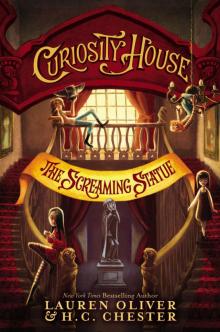 The Screaming Statue
The Screaming Statue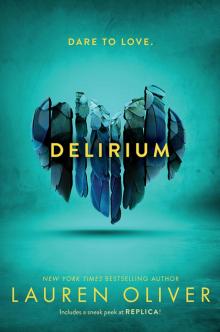 Delirium
Delirium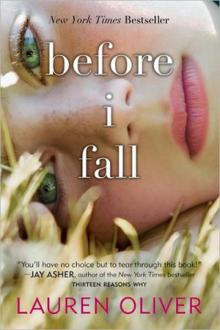 Before I Fall
Before I Fall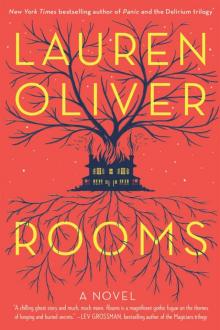 Rooms
Rooms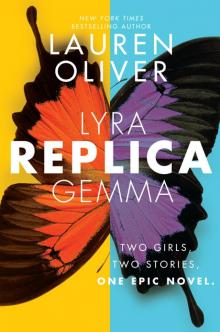 Replica
Replica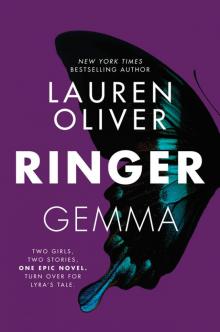 Ringer
Ringer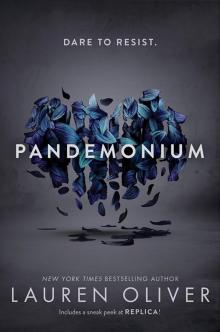 Pandemonium
Pandemonium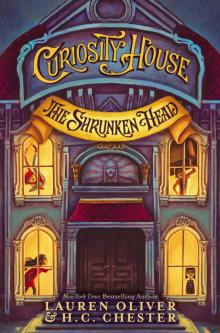 The Shrunken Head
The Shrunken Head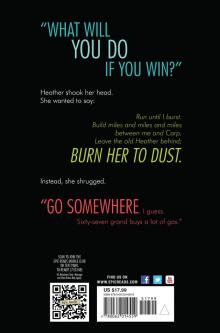 Panic
Panic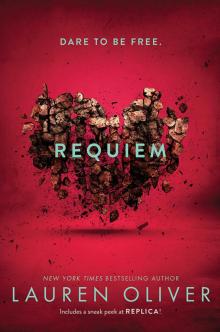 Requiem
Requiem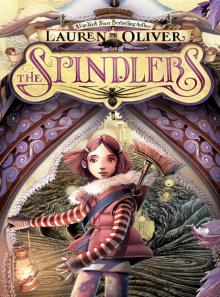 The Spindlers
The Spindlers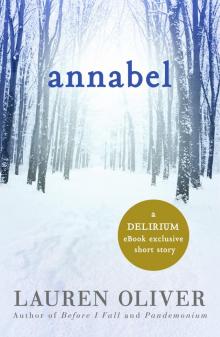 Annabel
Annabel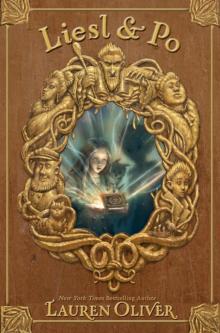 Liesl & Po
Liesl & Po Raven
Raven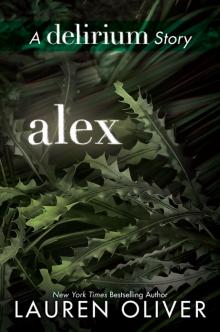 Alex
Alex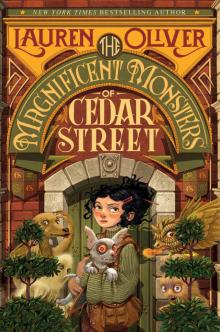 The Magnificent Monsters of Cedar Street
The Magnificent Monsters of Cedar Street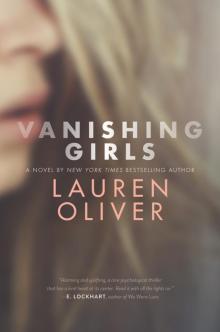 Vanishing Girls
Vanishing Girls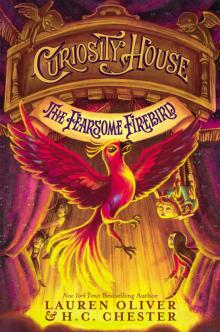 The Fearsome Firebird
The Fearsome Firebird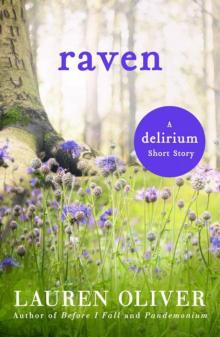 Raven: A Delirium Short Story
Raven: A Delirium Short Story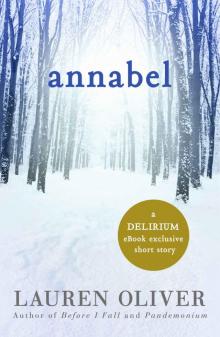 Annabel: A Delirium Short Story
Annabel: A Delirium Short Story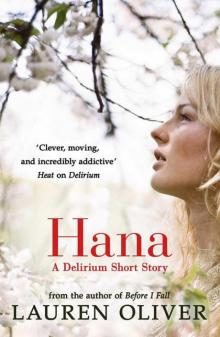 Hana: A Delirium Short Story
Hana: A Delirium Short Story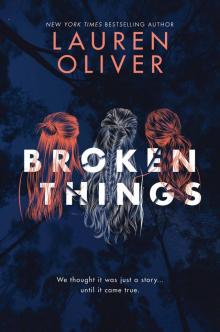 Broken Things
Broken Things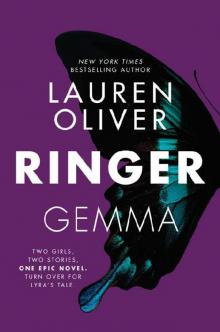 Ringer (Replica)
Ringer (Replica)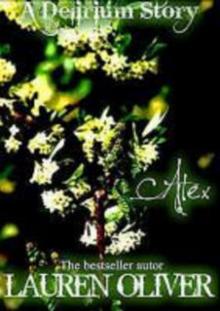 Alex (delirium)
Alex (delirium)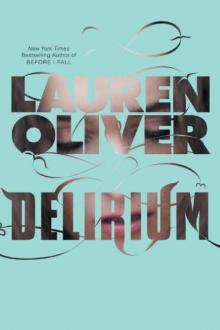 Delirium dt-1
Delirium dt-1